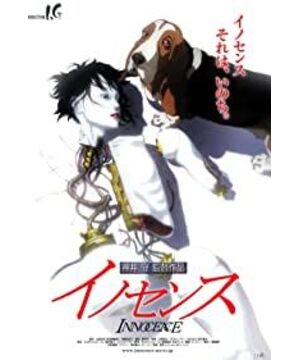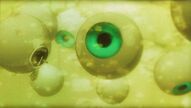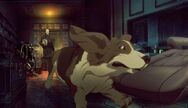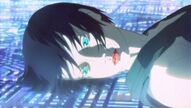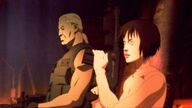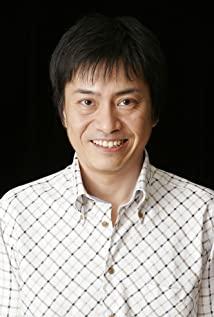"Aren't dolls a purer existence than humans?"
The puppet is just a mechanical structure, and the puppet in the film is just loaded with an "algorithmic structure" on this basis.
"Construction" is just a body, naturally there is no "soul".
Motoko downloads consciousness from the cloud into the body of the doll, and thus the body and soul become one.
Criminal organizations kidnap children, copy children's souls, inject dolls, and become "lifelike" bestsellers
These two actions are justifying the name of the unique "soul" of human beings.
Compared to the other command-driven puppets on the ship, the puppet loaded with Motoko's soul is more human-like.
Compared with other doll products without children's souls, the dolls loaded with children's souls are more human.
But the film is constantly using lines and details to question the reality of the "soul".
Motoko said that the doll's electronic brain capacity is too small, and he only downloaded a small part of himself. Does this incomplete "Suzi" possess the soul of Suzi? If so, is the soul separable? Then wholeness is not important to the soul? And what is the soul?
And Suko's last line
"Sorrow for the blood of birds, but not for the blood of people. It is fortunate for those who have voices."
"If the doll had a voice, he would say the lines that he didn't want to be human."
It seems to be proposing the subjectivity of the doll again.
There is no soul, but there is a subject.
The human soul is just the same existence as the main body of the doll.
From here, you can go back to the line at the beginning
"Compared to humans, dolls are purer beings"
Compared with puppets, what is "not pure enough" for human beings?
That is to say, the "soul" of human beings is something different from all things. This obsession has become a cage that people carry with them.
Suzi finally said that living in the cloud of the Internet has "no worries"
And quoted the Buddhist sutra "I walk alone in the world, my heart is self-purifying, I have no desires and no desires, like an elephant in the forest"
In the film, Suzi is a transcendent existence. She seems to have a soul, but also seems to have no soul. She helps Bart's actions in various ways, but there is no constant "image", sometimes it is text, sometimes it is a picture, sometimes it is a doll.
Compared with Suzi's free and easy, the other human beings in the film are obviously entangled in the "soul" of human beings.
The whole crime is because consumers prefer dolls with human souls, so manufacturers are motivated by interests, kidnapping children to copy souls and inject them into dolls.
The puppet's cry for help and the "abnormal" violent behavior of the puppet are also the reasons for the impact on society and the need for Bart and others to file a case for investigation.
Interestingly, what makes the puppets come alive and is very popular is the same "soul" that makes the puppets cry for help and violently attack humans.
In other words, the same "abnormality", an extra thing that the puppet should not have.
People like the former and fear the latter.
It can be seen that what people love is not the "soul", but only the "lifelike" "slaves"
And the weak and arrogant preference of humans makes the puppets and human children become each other's cages, and both lose their freedom.
And comparing the puppet with the soul of a child and the puppet with the soul of a prime son, you will find a more interesting point
Motoko does not reject being a puppet, and gets along very harmoniously with the puppet's body, because she doesn't seem to have an unchanging soul, let alone a body.
The child's soul, however, has to fight against the doll's body because of its desire to return to its own body and liberate it.
Back to the topic of this article
Ghost is a Shell
Is it a criminal organization that imprisoned children? A doll's body?
Or the child's own soul?
I just mentioned that what humans like are just "lifelike" "slaves".
Is the human soul just a "lifelike" "slave"?
A self with relatively stable attitudes, behaviors, and emotional characteristics.
Who is the slave owner?
The answer can be twofold:
1. External: Society, Others, Organization
External objects expect to interact with a relatively stable you, so there is bound to be a need to limit your possibilities.
2. Inside: oneself
I can't stand a disorganized, diverse self, so I long to maintain a simple, stable self
A more abstract, yet more meaningful answer is:
Obsession with "Reality".
In fact, stable and unchanging features are necessarily required.
And the stubbornness of this obsession will of course sacrifice "possibility".
When we use one "possibility" to obliterate other "possibles"
When we use one "soul" to obliterate other "souls"
When we use one "self" to obliterate other "selfs"
We became slave owners and slaves
like that kid
like that manufacturer
like those doll consumers
Holding on to "real" is like an endless needle and thread, weaving a net of three thousand great thousand
On the other hand, the prime minister is free to traverse the net.
She gave up her body, but had the freedom to enter any body
She gave up her soul, but has the freedom to weave any soul
At the end of the film, Bart asks Suzi, who lives in the cloud: "Do you think you are so happy now?"
What was Suko's answer?
"What a nostalgic value."
In the film, Bart believes in the soul and also in happiness. But it is precisely because of this limitation that he cannot understand Motoko.
Motoko seems to be just a phantom that he can't touch, and only when he turns into a puppet can he put his clothes on her.
And Motoko seemed to understand him and said, "You're still such a gentleman."
She understood that Bart was Bart because of his limitations. Just like at this moment, the reason why she was able to physically interact with Bart was because she was confined to this doll.
Limitation is existence.
Existence means limitation.
Motoko understands this, so she is not afraid of limitations. Every act of participating in this world is a limitation.
But after the action, that limitation dissipated, just like at the end of the film, after helping Bart, she left the doll and disappeared into the vast Internet.
View more about Ghost in the Shell 2: Innocence reviews


